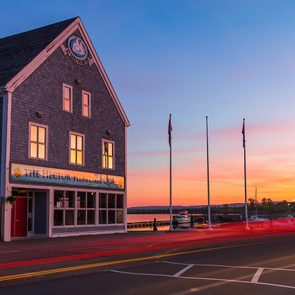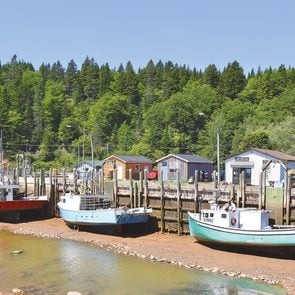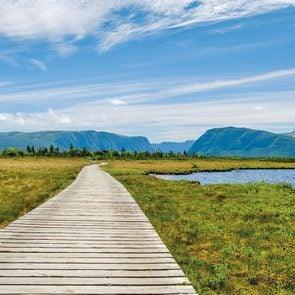How the Delta variant is different
COVID-19 is upending our lives once again, thanks to the new, super-spreading Delta variant. First identified in India in December of 2020, Delta now represents more than 83 percent of new cases in Canada, according to the Public Health Agency of Canada.
It’s flying far and wide among unvaccinated people, pushing overall case rates up and straining hospitals, once again, to the brink. This is what fully vaccinated and unvaccinated people need to know about the dominant Delta variant.
Delta is more infectious
The most worrisome feature of the Delta variant is that it spreads much more easily than earlier versions. One person with the original virus would infect 2.5 other people, on average.
Meanwhile, Delta is known to infect five to eight other people, says Ravina Kullar, PharmD, a spokesperson for the Infectious Diseases Society of America (IDSA) who is also adjunct faculty at UCLA’s David Geffen School of Medicine.
According to internal CDC documents reported by The New York Times, the variant is as contagious as chickenpox and more transmissible than MERS, SARS, Ebola, the common cold, the annual flu virus, and smallpox. It is not as efficient at mutating as HIV, the virus that causes AIDS.
Delta will spur more “breakthrough” infections
“If you’re vaccinated, you’re still much less likely to get very sick, but you’re more likely [to get infected] than with the previous version,” says Aaron Glatt, MD, a spokesperson for the Infectious Diseases Society of America and chief of infectious diseases at Mount Sinai South Nassau in New York.
That’s simply the result of higher numbers overall. Infections in vaccinated people are breakthrough infections. Currently, breakthrough infections represent only about 0.01 percent of all COVID-19 infections. That proportion isn’t likely to change, but as overall infections go up, so will spillover into vaccinated people.
The vaccines can still protect you
The available data are preliminary but, so far, it looks like two doses of the Pfizer mRNA vaccine are about 88 percent effective in warding off COVID-19 symptoms. That’s down from the 95 percent figure cited for the earlier variant, but still shockingly high.
The Moderna vaccine is also highly effective against Delta, possibly higher than Pfizer, says John Zaia, MD, director of City of Hope’s Center for Gene Therapy in Duarte, California. The one-shot Johnson & Johnson vaccine is less effective against Delta but, Dr. Zaia points out, still very good at preventing hospitalizations and death, as are Pfizer and Moderna, also. (This is what you need to know about blood clots and COVID-19 vaccines.)
Everyone will probably need boosters one day
On August 12, the U.S. Food and Drug Administration granted an emergency use authorization for a third booster shot of Pfizer and Moderna for people with weakened immune systems, including organ transplant recipients. Immunocompromised people don’t respond as well to vaccines and are already at a heightened risk of severe illness and death from COVID-19.
The Delta variant likely played a major role in the FDA approval, says LaTasha Perkins, MD, a family physician in Washington, D.C. “The booster may offer immunocompromised people the same level of protection as a non-compromised immune system has,” she says.
There may be more help for this group coming. Dr. Zaia and his colleagues are currently enrolling for a Phase 2 trial of a COVID-19 vaccine. It is specifically for people with less robust immune systems.
“The first vaccine that comes along is not the last one,” says Dr. Zaia, who believes we will all need boosters at some point. “As a virus becomes endemic, you have annual shots.”
Delta probably doesn’t make you sicker
Some studies have suggested that Delta actually makes you sicker with more patients hospitalized than the original virus, but others contradict this idea. “I don’t believe it’s causing more serious illness,” says Dr. Zaia. “We see more hospitalizations and deaths because there are more cases.”
Delta seems to produce the same symptoms as earlier versions of the virus, that is to say, fever and chills, cough, difficulty breathing, loss of taste or smell, headache, congestion. There are some early hints that cough and loss of smell may be less common with Delta.
As with previous mutations, vaccinated people usually have much milder symptoms, and are less likely to go to the hospital or die due to the infection.

Delta hits children hard
A British study found that positive COVID-19 tests in children ages five to 12 seemed to be driving much of the growth of the Delta variant. (Note that this research article is a preprint and has not been peer-reviewed, yet.)
This is probably a factor in how fast the virus spreads, rather than any specific mutation targeting children, says Dr. Zaia.
There’s also no vaccine approved for children. Overall, notes Dr. Zaia, “Most of people in any age group who are in the hospital or dying are unvaccinated.”
Vaccinated people can still transmit Delta
In fact, they may be more infectious given that viral loads from Delta may be as much as 1000 times higher than previous strains, according to one study in the journal Genomic Epidemiology.
“Delta has increased the amount of virus that appears in your throat and nose,” says Dr. Zaia. That’s both in vaccinated and unvaccinated folks.
The slightly better news is that vaccinated people may not be infectious for as long as someone not vaccinated. (Here’s why some people are more likely to spread COVID-19 than others.)
Delta isn’t the first mutation, and it won’t be the last
As an RNA virus, SARS-Cov-2 mutates almost by definition. Most of the mutations have no additional impact on human health compared to the first strain of the virus that swept the globe, but some do.
One was the Alpha variant, first identified in the U.K. “I would say that’s put to shame by the Delta variant,” says Dr. Kullar. Beta (South Africa) and Gamma (Brazil) are also “variants of concern.” The emerging Lambda version, first noticed in Peru, is a “variant of interest.”
Getting more people vaccinated is the only thing that will stop the spread of new, potentially more deadly, and more infectious variants. “If anything, the Delta variant tells us that everyone needs to get vaccinated,” says Dr. Kulular. “The more people who are vaccinated, the closer we are going to get to herd immunity.” (Herd immunity is when there are enough people vaccinated in a community to break the chain of infections.)
Masks still work
The CDC recently updated its guidance to recommend that even vaccinated people wear masks in public indoor places in areas of substantial or high transmission. “The importance of masks, physically distancing, not having mass gatherings indoors or outdoors needs to be reemphasized,” says Dr. Kullar.
In fact, masks may be more important than ever, no matter your vaccination status. If you haven’t been vaccinated and are able to do so, go do it. You may have heard some ludicrous COVID-19 vaccine conspiracy theories, but you can comfortably dismiss them. (And no, the COVID-19 vaccines do not cause infertility.) If you are vaccinated, pay attention to any boosters you may need and mask up when you’re in high-risk situations.
Next, here’s what you need to know parosmia, the COVID-19 side effect that distorts your sense of smell.

Atlantic Canada Travel for the Whole Family
Vacationing and travelling amid a pandemic has been, to say the least, different. Last summer, as we took advantage of the Atlantic Bubble to explore closer to home, extra precautions were taken at each stop by both my family and those at the locations of our stops, as we all attempted to adjust to the “new normal.” It’s about looking after our fellow Canadians so we can see the light at the end of the tunnel, but at the same time trying to keep things as normal as possible in order to keep some sort of sanity. It has been a tough act to balance at times, especially as essential workers in the pharmacy and grocery store business.
I am the vacation planner of our family, which includes my husband, Joey, our then nine-year-old daughter, Hayley, and our dog, Winston. Normally, our trips entail a combination of visiting tourist attractions, such as amusement parks and zoos, as well as checking out local nature, including walking and biking trails, beaches, lighthouses and waterfalls. (Check out Canada’s most beautiful waterfalls.)
Last summer was about getting out to explore and see sights, some for the first time. While we would have been happy to spend our time exploring our home province of New Brunswick, we were glad to have the Atlantic Bubble open up just in time for the tourist season.
Over the course of the summer, during our various vacation times and extended weekends, we explored three out of the four provinces that make up Atlantic Canada. It will be such a relief when our entire country opens up, and we have the freedom to wander where we choose without limitation.

Prince Edward Island
One thing that has been constant during this whole pandemic is that I have always had either my camera or my phone with me to capture our memories, wherever we ended up!
After the news that we could travel throughout the Maritimes, we decided to continue with our plans to visit Prince Edward Island, famous for its red soil, beautiful beaches, home-grown potatoes and, of course, a beloved red-headed girl by the name of Anne of Green Gables. We weren’t sure what to expect, and while there were still tourists around, it wasn’t the usual hustle and bustle of the summer season. A little piece of me was missing the annual Cavendish Beach Music Festival, as it would have been my 11th year attending. Due to COVID restrictions, the festival wasn’t able to happen, but I was glad to see they were putting their site to good use by putting on their drive-in concert series. (Check out the most famous house in every province.)

Typically, we camp in Cavendish and centre our adventures around the Green Gables Shore area. We are always open to exploring other areas of the province though. Winston has always camped with us wherever we go. It just so happened that he was celebrating his 13th birthday while on the island, so we took him to Blooming Point, a beautiful, long, sandy beach. It was an extremely windy day, so there weren’t many beach-goers, enabling him to roam freely and splash in the water, which in turn made us happy.
We used to do a lot of walking, but over the last few years, Winston has been unable to keep up, and because of that we have started biking a lot more. My husband added a carrier to the back of his bicycle, allowing Winston to continue his adventures with us. Cavendish has many biking trails, many of which can be reached without having to load the bicycles onto the back of our SUV. Plus, the trails are well cared for and relatively flat, which we love.

I enjoy visiting lighthouses; the water views and towering structures in other provinces remind me of the ones at home. We climbed to the top of Point Prim, the first lighthouse built in P.E.I. It was originally made solely of bricks but was later covered with wood shingles for protection. We then strolled along the beach at West Point. I particularly loved West Point Lighthouse with its black-and-white striped paint, as most lighthouses you see locally are white and red.

After taking a random night shot of the sky on a beautiful evening at our campground in P.E.I., I was drawn to a particular spot in the photo. I took the shot again, thinking maybe I just moved my phone slightly, causing it to blur. The result was the same. I zoomed in, and as I did so, I recalled talk of the NEOWISE comet on some friends’ Facebook pages. It turns out what I thought was at first a blur in the photo was actually the Comet NEOWISE! Since I knew it would be sticking around for a bit longer, I made plans to photograph it with my DSLR camera once back in my home province of New Brunswick. Green’s Point Lighthouse in L’Etete made the perfect location late one evening a few days later. I was fascinated with the result of capturing this rare event with such an amazing backdrop along the shore. This comet is not expected to be visible from Earth again for thousands of years from now. (Here are the best places in Canada for stargazing.)

Nova Scotia
A place I’d wanted to visit for quite some time was Peggy’s Cove, so it was on our list when next we headed to the picturesque province of Nova Scotia. We were surprised by the landscape. The terrain was very rocky and unique, adding to the charm of the little community along the shore of St. Margaret’s Bay. Nestled on a bed of smooth rocks stands the famous Peggy’s Cove Lighthouse. I’m intrigued with photographing sunsets, especially by the water, so we made sure to be there to watch the sun go down. We were not disappointed. (Find out the best place to watch the sunset in every province.)

Our campground in the Halifax area was on the banks of the Sackville River, which also allowed for some pretty sunset photos.

New Brunswick
Living in the Maritimes means we have spent a lot of time along the coasts of our provinces. That certainly applies to time spent in our home province of New Brunswick. We spent time wandering the countryside and farmland around the Alma area and Fundy National Park. At the time of our visit, some trails were not accessible, but there are numerous places to explore the forest, follow rivers and walk on the ocean floor. Fundy is not limited to summertime use as the park is available all year round. So too is Kouchibouguac National Park, which we visited while camping in the Bouctouche area. There are more than 60 kilometres of bicycle trails in Kouchibouguac, and we biked a total of 23 kilometres over a two-day period. (Check out the best bike trails across Canada.)
Another favourite place of ours to visit is Shediac, New Brunswick, where there are trails that lead to the beach, through the woods to the Pointe-Du-Chene Wharf and downtown to the local market, among other places.
Sadly, we lost our boy Winston to cancer at the end of August, but we are so thankful to have spent that extra time with him, and we can cherish the happy look on his face as he spent his last days wandering the beaches, being chauffeured around behind our bikes, eating ice cream and, most importantly, spending time with his humans. Our adventures will be very different without him, but we will continue to journey on as there is still so much to see and do.
I encourage everyone to spend time with your family. Get out and explore as much as possible. A bright side to the pandemic restrictions is that it has opened our eyes to the opportunity to see places and things that we may have overlooked or not taken advantage of in the past.
Enjoyed these Atlantic Canada travel ideas? Check out 10 more essential experiences on Canada’s east coast.





